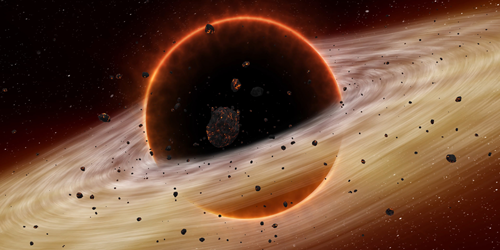Accretion Explored through Gravitational Waves
Accretion disks play a central part in the formation and evolution of various celestial objects, including planets, stars, and black holes. But our knowledge of these disks is limited by the fact that they can currently be studied only through modeling or electromagnetic observations. Now Lorenzo Speri at the Max Planck Institute for Gravitational Physics in Germany and his colleagues show how accretion disks could also be probed using gravitational waves [1]. The team’s findings highlight the wider potential of gravitational-wave observations, which have already provided key insights into both the nature of black holes and gravity.
The researchers considered an “extreme mass ratio inspiral” system in which a compact object of 50 solar masses orbits within the accretion disk of a black hole of a million solar masses. As this smaller object orbits the massive black hole, it emits gravitational waves that cause it to gradually spiral inward. The properties of these waves depend on the object’s orbital path, which is affected by torques induced by the accretion disk. Therefore, observations of the gravitational waves might reveal valuable information about the disk.
Speri and his colleagues determined that such torques could be precisely measured by the Laser Interferometer Space Antenna (LISA), a space-borne gravitational-wave detector that is scheduled for launch in 2037. Assuming an accurate torque model, these data could be turned into constraints on the disk’s accretion rate and viscosity and could even be combined with electromagnetic observations to directly measure this viscosity. However, the team stresses that creating such an accurate model depends on further research to fully understand how accretion disks affect embedded compact objects.
–Ryan Wilkinson
Ryan Wilkinson is a Corresponding Editor for Physics Magazine based in Durham, UK.
References
- L. Speri et al., “Probing accretion physics with gravitational waves,” Phys. Rev. X 13, 021035 (2023).




